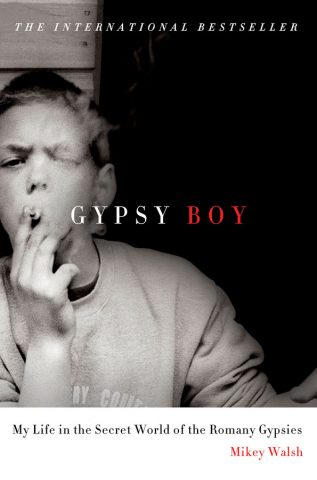When you were very small, there wasn’t much you wanted. Clean diapers, a cuddle, and food made the shortlist early- on. By the time you hit school, your wants became more complicated. You wanted to stay up late, snack before dinner, and possess that cool toy you saw on TV.
Author Mikey Walsh wanted those things, too, but he never wanted to become a fighter. As you’ll see in his memoir, Gypsy Boy, his father had other ideas.
Mikey’s father was “fiercely determined” to have a son. In Romany culture, having a male child was everything—even more so for the Walsh family, which was known for generations of manly men who were good with their fists. So, even though his mother was told that her heart condition precluded a second child, Mikey followed his sister in succession. Upon the happy event, Mr. Walsh hung golden boxing gloves around his newborn son’s neck.
Growing up, Mikey loved the dramatic. He and his older sister, Frankie, enjoyed dress-up and pretending games. They loved watching TV and, largely unsupervised, they played outside with their cousins, who lived on the same compound.
It was an idyllic early childhood but at age four, Mikey’s destiny caught up with him. His father decided that it was time to start fight-training, and the best way to do it was to beat the boy. His disgust at Mikey’s cries meant more punches.
By age seven, Mikey was being “hidden” in school, by his mother, which was an unusual move. Gypsies were mostly forbidden to mingle with “Gorgias” (non-Gypsies), and sending a child to a Gorgia school was scandalous. It was her way of keeping Mikey safe, though, and it gave him a chance at an education, which was something she didn’t have. Yet, the beatings continued—always daily, sometimes more.
By age 13, Mikey realized that he was gay which, he knew, would enrage his father. He also knew that he needed to escape before it cost him his life.
Pseudonymous author Mikey Walsh lulls his readers into first believing that they’re reading a droll memoir filled with quirky relatives and a secret world that few have dared write about. Walsh busts a few myths about Romany culture, pokes gentle fun at his family, and makes us laugh out loud while he’s doing it.
But much like a cur that can’t be trusted, “Gypsy Boy” turns quick and bites. Walsh takes the laughter and, two pages later, spins it in horror and painfully stoic emotion that only serves to underscore the brutality he describes—which ultimately leads to an end that shimmers like a tambourine.
Published in Europe three years ago, Gypsy Boy is new in this country and cannot be missed.


What Do You Think?